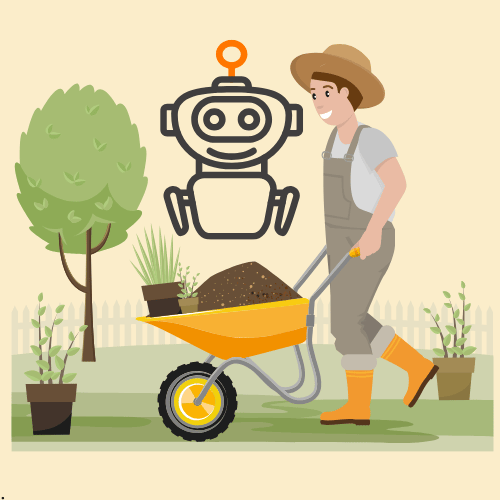AI Agents for Gardening Companies: The Marketing Playbook

Gardening businesses live and die by local demand. Calls spike in spring, taper in winter, and leads often slip away when you are out on a job or knee-deep in mulch. AI agents change that equation. They work in the background to attract the right searches, follow up instantly, and nudge happy customers to leave reviews that lift your rankings. Think of them as a tireless crew that handles marketing tasks while your team handles lawns, hedges, and designs.
This playbook shows how to deploy AI across the marketing funnel. You will see where AI agents fit, what to prioritize first, how to measure real results, and how to avoid common pitfalls.
Want to get started with an AI Agent for your Gardening Company today? Get the Marketing Manager in Your Pocket!
FieldSprout is like hiring a marketing manager, without the salary. The AI agents plan, write, and schedule ads, posts, and emails. You just approve by email and get back to running your crew.
Chapters
What AI Agents Mean in a Gardening Context

An AI agent is software that observes, decides, and acts. In marketing for gardeners and landscapers, that can look like a website assistant that answers questions about pruning schedules, an SMS follow-up bot that turns quote requests into booked visits, or a content engine that produces city pages and service pages that match what locals actually search for.
Good agents use your service catalog, pricing rules, service areas, photos, and brand voice. They do not guess. They pull from your data to give relevant answers and to trigger the next best action, like sending a deposit link or scheduling a site visit.
Get Found: Local Search That Actually Matches Demand
Most gardening companies rank for their brand name but miss high-intent searches like “lawn care near me,” “hedge trimming [city],” or “native garden design [neighborhood].” AI agents help you close those gaps.
They analyze search patterns in your area and translate them into pages that answer intent. That means service pages that mirror the way people talk, not how software vendors name features. It also means structured data so Google understands you serve specific suburbs, accepts online booking, and has recent reviews. Over time, the agent identifies thin or overlapping content and consolidates it, so your site does not compete with itself.
Capture and Convert: Speed-to-Lead Without Extra Staff
Leads are perishable. When someone sees aphids chewing their roses, they want help now. AI follow-up agents respond in seconds by SMS or email. They ask two or three qualifying questions, provide a clear next step, and place a hold on a time slot if you allow it. If the homeowner goes quiet, the agent sends a polite nudge later that day, then a final reminder tomorrow. You stay top of mind without sounding robotic.
The same agent can route calls and chats. If it detects urgency, it escalates to a human. If it is a routine mowing quote, it gathers measurements, confirms access, and books a visit. That consistency alone lifts conversion rates, especially after hours.
Reviews and Referrals: Build a Reputation Flywheel
Your best marketing asset is a steady stream of recent five-star reviews with photos. AI review agents request feedback at the right moment. They personalize the message, include the correct links, and avoid pestering customers who already responded. Happy clients get a gentle prompt to share a photo of their new beds or tidy lawn. The agent also tracks negative feedback privately, so you can fix issues before they spill onto public platforms.
Once reviews grow, your visibility improves, which brings more leads that convert faster. That is the flywheel. AI keeps it spinning with little manual effort.
Ads That Waste Less and Win More
Paid ads can be a black hole if you are not careful. AI ad agents monitor search terms, shift budgets toward profitable suburbs, throttle bids during low-quality hours, and test copy that mirrors real questions homeowners ask. They also pipe call and form outcomes back into the ad platforms so the algorithms learn which clicks became booked jobs, not just inquiries.
Manual vs AI-Assisted Ads (quick view)
Use this quick comparison to spot where AI can cut wasted ad spend and lift booked jobs. Start by matching your current workflow to the left column, then adopt the AI upgrades that deliver the fastest wins.
| Task | Manual | AI-Assisted |
|---|---|---|
| Keyword expansion | Sporadic brainstorms | Continuous from live search terms |
| Budget and bids | Weekly tweaks | Hourly guardrails based on CPL |
| Creative testing | 1–2 variants per month | Ongoing small tests, auto-winners |
| Negative keywords | Added after wasted spend | Proactive from pattern detection |
Content Engine: Pages That Rank and Educate
Content works when it solves a problem for locals. AI can draft pages about seasonal cleanups, water-wise planting, or hedge rules in your municipality. It can also create city pages that highlight landmarks and common yard sizes, so the copy feels local, not generic. You should still add your photos, service details, and pricing ranges. That blend of AI speed and your expertise is what wins.
6-Week Local Content Sprint
This six-week plan builds local visibility fast. Swap in your real services and suburbs. Add your own photos to each page to boost trust and time on page.
| Week | Primary Piece | Support Asset | Goal |
|---|---|---|---|
| 1 | Lawn Care in [City]: Pricing, Schedules, Before/After | FAQ snippet on mowing heights by grass type | Rank for core service and build trust |
| 2 | Hedge Trimming Rules in [Council/City] | Checklist PDF for pre-visit prep | Capture regulatory intent |
| 3 | Water-Wise Plants for Small Yards in [Neighborhood] | Gallery of local installs | Earn shares and links |
| 4 | Garden Cleanups: Spring vs Autumn Packages | Upsell email template | Clarify offers and increase AOV |
| 5 | Native Garden Design Costs in [City] | Estimator widget intro copy | Qualify higher-value leads |
| 6 | Lawn Renovation Timeline: From Soil Test to First Mow | SMS nurture sequence draft | Nurture slower buyers |
Strategy, Not Just Tools: A Simple Rollout Plan of AI Agents

Start with a candid audit. Where do you lose leads now? If voicemail is full every Friday, prioritize a voice or SMS follow-up agent. If you are invisible in nearby suburbs you actually serve, begin with the content engine and directory sync.
Phase one should deliver quick wins in 30 to 45 days. That usually means launching a small cluster of high-intent service pages, turning on instant follow-ups for forms and calls, and asking for reviews after each completed job. Phase two expands to ads optimization and broader local coverage. Phase three layers in referral nudges and a light CRM cadence so past clients hear from you before the next season.
Measurement That Matters
Do not drown in vanity metrics. Track the few numbers that predict revenue: how many qualified leads you received, how fast you replied, what percent became booked visits, and your cost per booked job. For ads, include phone call outcomes, not just form fills. For SEO, watch the growth of non-brand impressions and clicks in your target suburbs.
KPI Snapshot
These KPIs tie directly to revenue. Review them weekly. If one dips, check the matching AI agent first. Small tweaks there usually restore momentum.
| KPI | Target | How AI Helps |
|---|---|---|
| Speed to first reply | Under 2 minutes | Instant SMS and email responses |
| Lead to booked job | 35–55% | Smart follow-ups and reminders |
| Cost per booked job | Within target margin | Bid and budget guardrails |
| Review volume | 10+ per month | Automated, well-timed requests |
Tech Stack Blueprint
Keep it lightweight. You need a website that is easy to edit, a phone system that logs calls, an inbox for SMS and email, and a CRM or job tracker. Your AI layer sits on top and talks to each piece through simple integrations. Start with the modules that will pay for themselves fastest. Avoid sprawling stacks that nobody wants to maintain.
Pricing and ROI: Make the Numbers Work
ROI comes from three places. First, you convert more of the traffic you already have. Second, you get found for more local searches that lead to jobs. Third, you reduce wasted ad spend and admin time. Model it like this: if instant follow-ups lift your booking rate from 30 percent to 45 percent and you average 40 inquiries a month, how many extra jobs do you land and what is the profit on those? Often that math covers the monthly software bill with room to spare.
Guardrails: Brand, Compliance, and Good Taste
Be clear when customers are chatting with an assistant. Get consent for SMS. Keep your brand voice consistent. Train your agent with your actual services, service areas, and exclusions. Nothing hurts trust faster than promising a service you do not offer or a suburb you do not visit.
Common Mistakes and Quick Fixes
If pages are thin, combine them into stronger hubs with clear internal links. If ads attract bargain hunters for high-end design work, tighten your keywords and ad copy to emphasize planning fees and design scope. If reviews stall, shorten the request message and send it within an hour of job completion. Small tweaks compound.
Conclusion
AI agents will not plant the lavender or edge the beds. They will, however, keep your pipeline healthy, your schedule full, and your reputation growing. Start with one or two modules that solve your biggest bottleneck. Measure real outcomes. Then add the next piece. The goal is simple. Less chasing, more booking, better work on the ground.
FAQs AI Agent for Gardening Companies
What is an AI agent for gardening marketing?
It is software that runs key marketing tasks for you. Think local SEO content, instant SMS and email follow-ups, review requests, and ad tuning across Google and social.
How does it help me get found locally?
Agents create and update service and city pages, sync your listings, add local schema, and map your services to “near me” searches so you show up where buyers look.
Can AI really increase booked jobs, not just leads?
Yes. Speed matters. The agent replies in seconds, qualifies the request, offers times, and nudges politely if the homeowner goes quiet. That lift in response speed raises bookings.
Which channels can an AI agent manage?
Google Search and Maps, Meta ads, local directories, website chat, phone callbacks, and follow-ups by SMS and email. Results roll back into your CRM for tracking.
Will this replace my office staff?
No. It handles repetitive tasks at scale so your team can focus on estimates, design advice, and customer care. Humans stay in the loop for edge cases and high-value jobs.
How do I measure ROI?
Track lead volume, time to first reply, lead-to-booked rate, cost per booked job, review count and rating, and revenue by channel. Compare 30, 60, and 90-day cohorts.
What about reviews and reputation?
The agent sends well-timed review requests with the right links, routes negative feedback to you privately, and encourages photo reviews. More recent 5-stars improve rankings and trust.
Master the Art of Video Marketing
AI-Powered Tools to Ideate, Optimize, and Amplify!
- Spark Creativity: Unleash the most effective video ideas, scripts, and engaging hooks with our AI Generators.
- Optimize Instantly: Elevate your YouTube presence by optimizing video Titles, Descriptions, and Tags in seconds.
- Amplify Your Reach: Effortlessly craft social media, email, and ad copy to maximize your video’s impact.
The post AI Agents for Gardening Companies: The Marketing Playbook appeared first on StoryLab.ai.


Deixe um comentário